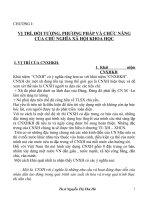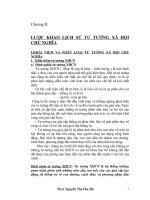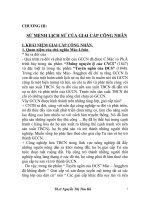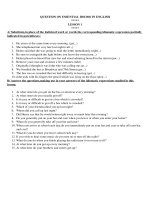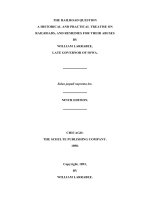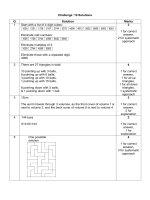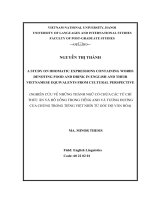QUESTION ON IDIOM
Bạn đang xem bản rút gọn của tài liệu. Xem và tải ngay bản đầy đủ của tài liệu tại đây (33.15 KB, 4 trang )
QUESTION ON ESSENTIAL IDIOMS IN ENGLISH
*****
LESSON 1
*****
A/ Substitute,in place of the italicized word or words the corresponding idiomatic expression partially
indicated in parentheses:
1. He arises at the same time every morning. (get...)
2. She telephoned me very late last night.(call...)
3. Helen said that she was going to mail the letter immediately.(right...)
4. Be sure to extinguish the light before you leave the room.(turn...)
5. Helen placed on herself her new hat and stood admiring herself in the mirror.(put...)
6. Remove your coat and sit down a few minutes.(take)
7. Originally,I thought it was John who was calling me.(at...)
8. We boarded the bus at Broadway and 79th Street.(get...)
9. The bus was so crowded that we had difficulty in leaving.(get...)
10. John took with his fingers the pencil which was lying on the floor.(pick...)
B/ Answer the questions,making use in your answers of the idiomatic expressions studied in this
lesson:
1. At what street do you get on the bus or streetcar every morning?
2. At what street do you usually get off?
3. Is it easy or difficult to get on a bus which is crowded?
4. Is it easy or difficult to get off a bus which is crowded?
5. Which of your friendscalled you up last night?
6. Whom did you call up last night?
7. Did Henry say that he would return right away or much later this evening?
8. Do you generally put on your hat and coat when you leave or when you enter your home?
9. When do you generally take off your hat and coat?
10. When you arrive at school each day,do you immediately put on your hat and coat or take off your hat
and coat?
11. What do you do when you leave school each day?
12. If you wish to hear some music do you turn on or turn off the radio?
13. What do you do when you finish playing the radio:turn it on or turn it off?
14. At what time do you get up every morning?
15. At what time do your brothers and sisters get up?
QUESTION ON ESSENTIAL IDIOMS IN ENGLISH
*****
LESSON 2
*****
A/ Substitute,in place of the italicized word or words the corresponding idiomatic expression partially
indicated in parentheses:
1. Mary is seeking the pocketbook which she lost yesterday.(look...)
2. As always,John is late again for the lesson.(as...)
3. Did you discover what his name was?(find...)
4. I am extremely tired after all that physical exercise today.(tired...)
5. He said that he would wait for us exactly here on this corner.(...here)
6. Some old friends of my father visited us last night.(call...)
7. Gradually,his English seems to be getting better.(little...)
8. They are awaiting their brother who is arriving tonight on the five o'clock train.(wait...)
9. We waited and waited and finally he arrived.(at...)
10. He sait that it would be satisfactory for us to call again later.(all...)
B/ Answer the questions,making use in your answers of the idiomatic expressions studied in this
lesson:
1. Why were you tired out after your walk in the park yesterday?
2. Which friends called on you last night?
3. What friends do you yourself expect to call on next week?
4. when Helen offered to help you with your homework,why did you say,"Never mind!"?
5. Is your vocabulary in English increasing rapidly or only little by little?
6. What is the teacher looking for in her desk?
7. If you lose something,do you you look for it or look at it?
8. Do you like or dislike to have to wait for someone who is late?
9. How long did you have to wait for the bus this morning?
10. Why did Mary say that we should wait for her right here in this room?
11. How did you find out what moving picture they are showing tonight?
12. How do you find out at what time the picture begins?
13. Did you prepare your homework last night as usual?
14. Did the teacher say that is was all right for us to write our exercises in pencil?
15. What are all those people in the street looking at?
QUESTION ON ESSENTIAL IDIOMS IN ENGLISH
*****
LESSON 3
*****
A/ Substitute,in place of the italicized word or words the corresponding idiomatic expression partially
indicated in parentheses:
1. I don't like to go to the movies alone.(by...)
2. Suddenly the man removed a revolver from his pocket and began to shoot.(took...)
3. We discussed his plan for several hours.(talk)
4. I always like to recline for a half hour or so after lunch.(lie...)
5. It is always difficult for me to select a good present for my wife.((pick...)
6. John always works leisurely in everything that he does.(takr...)
7. How is Helen doing in her new French class?(geeting...)
8. It is of little importance to him whether ha passes his English examination or not.(make...)
9. I am sure that he didn't leave that cigarette there intentionally.(on...)
10. We spent the entire day looking for a new apartment.(all...)
B/ Answer the questions,making use in your answers of the idiomatic expressions studied in this
lesson:
1. How are you getting along in your study of English?
2. Which student in your class seems to be getting along best?
3. How is your friend getting along in his new job?
4. Do you prefer to go to the movies by yourself or with someone?
5. Did you come to the United States by yourself or with your family?
6. Do you like to talk over your personal problems with someone or do you prefer to decide things by
yourself?
7. Is it easy or difficult for you to pick out presents for yourfriends?
8. Does your friend live by himself or with someone?
9. Does someone help you to pick out your clothes or do you like to pick them out by yourself?
10. What did you do all day long yesterday?
11. When the "Star-Spangled Banner" is played,what should one do:stand up or sit down ?
12. Do you take your time when you are writing an examination or do you prefer to finish quickly?
13. What did the teacher just take out of the drawer of her desk?
14. During the lesson do you prefer to sit in the front of the room or in the back- or doesn't it make any
difference?
15. Why must Ellen lie down for several hours each afternoon?
QUESTION ON ESSENTIAL IDIOMS IN ENGLISH
*****
LESSON 4
*****
A/ Substitute,in place of the italicized word or words the corresponding idiomatic expression partially
indicated in parentheses:
1. You will first have to search for his number in the telephone book.(look...)
2. He asked me to come in and sit down.(take...)
3. The accident occurred on the corner of Broadway and 86th street.(take...)
4. I will consider your plan and give you an answer next week.(think...)
5. Henry didn't feel well enough to participate in the game.(take...)
6. Up to the present,we have enjoyed our trip very much.(so...)
7. He doesn't speak English in any degree.(at...)
8. The mother said to the child,"You have played long enough with your toys.Now please return them to
their proper place.(put...)
9. Did a young man or a young woman attendto you in that store?(wait...)
10. The salesman said to me,"Please test this coat,just for size"(try...)
11. You ought to spend two hours as a minimum in the fresh air every day.(at...)
12. In the evening we promenaded down Fifth Avenue.(take...)
B/ Answer the questions,making use in your answers of the idiomatic expressions studied in this
lesson:
1. How many new words do you have to look up in your dictionary every day?
2. If you do not know someone's telephone number where do you look it up?
3. In what century did the Amerian Revolution take place?
4. Where did the accident in which your friend was hurt take place?
5. How many idioms have we studied so far in this book?
6. So far,who is the best student in your English clas?
7. What is the difference between "to wait for a person" and "to wait on a person"?
8. Why was Herbert not able to take part in the meeting last night?
9. Approxiamately how many different countries take part in the Olympic games each year?
10. Do you have much money with you or no money at all?
11. Does your friend speak English well or not at all?
12. If you go to a store to buy something,do you prefer to have a man or a woman wait on you?
13. How many pairs of shoes did you try on before buy ing the pair which you are now wearing?
14. Are you a neat person and do you always put away things after using them?
15. Do you like or dislike to take part in discussions about politics?
